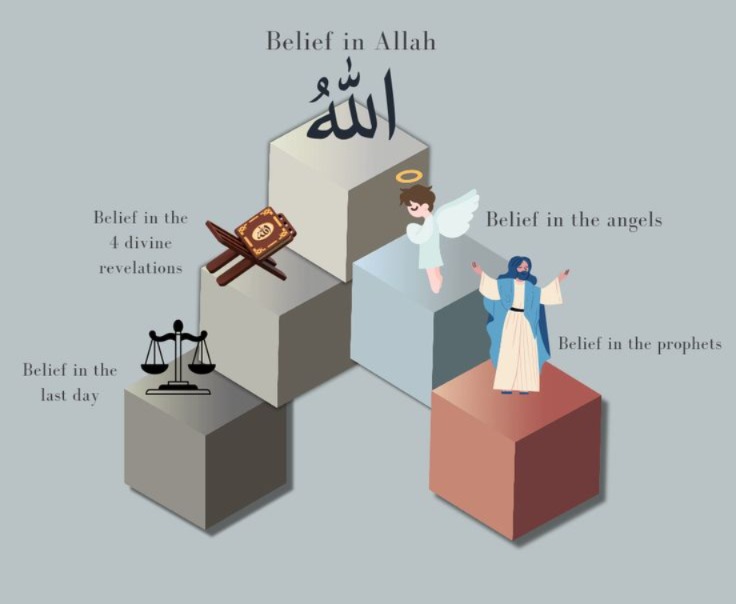
When we talk about Islam, one of the most important topics is the 6 Pillars of Iman—the core beliefs that form the foundation of a Muslim’s faith. Just as a building cannot stand without strong pillars, iman (faith) cannot stand without these essential supports. The 6 Pillars of Iman guide how Muslims see the world, strengthen their relationship with Allah, and shape their purpose in this life and the next.
Introduction to the 6 Pillars of Iman

In Islam, faith (Iman) is the foundation that gives purpose, direction, and meaning to a believer’s life. The 6 Pillars of Iman outline the core beliefs that every Muslim carries in their heart: belief in Allah, His angels, His revealed books, His messengers, the Last Day, and divine decree. These pillars are not just abstract concepts—they shape how a Muslim understands the world, lives their daily life, and prepares for the hereafter. Nurturing this faith, especially in children, helps them build a strong spiritual identity and a deep connection with their Creator.
Meaning of Iman in Islam
The term Iman comes from the Arabic root “amn,” which conveys a sense of peace, security, and trust. True faith brings a believer inner calm, as their heart rests in complete trust in Allah. Iman goes beyond words we speak with the tongue—it starts as a conviction in the heart and shapes our thoughts, behavior, and choices. In essence, it is the inner light that keeps a Muslim’s heart firm and steady.
Importance of Faith in a Muslim’s Life
Faith is more than a belief—in fact, it is a way of life. Faith strengthens a Muslim’s resilience during trials. During times of ease, it inspires gratitude. As a compass, it guides believers to choose right over wrong. The six pillars of Iman keep a believer’s worldview balanced. They root life in divine wisdom, nurture hope in Allah’s mercy, and build awareness of accountability in the hereafter. Without faith, the structure of worship and good deeds would lack foundation; with faith, every act gains meaning and reward.
What are the 6 Pillars of Iman?

Faith in Islam rests on six essential beliefs. A Muslim’s Iman becomes complete only when all six are firmly held in the heart. These pillars form the foundation of a believer’s relationship with Allah. They also guide how Muslims see the world, fulfill their responsibilities, and prepare for the hereafter.
The First Pillar of the 6 Pillars of Iman – Belief in Allah
Belief in Allah, or Tawheed, is the cornerstone of all faith in Islam. It forms the heart of a Muslim’s spiritual life, as recognizing Allah as the one true God is the essence of what it means to be a believer.
To truly believe in Allah is to acknowledge Him as the Creator of everything in existence. His being is unlike anything we know—beyond the limits of time, space, and human comprehension. Allah is unique, eternal, and independent, while all creation depends on Him for life, sustenance, and guidance.
This belief also means understanding that Allah is entirely distinct from His creation. As the Quran teaches in Surah Al-Ikhlas:
قُلْ هُوَ ٱللَّهُ أَحَدٌ ١ ٱللَّهُ ٱلصَّمَدُ ٢ لَمْ يَلِدْ وَلَمْ يُولَدْ ٣ وَلَمْ يَكُن لَّهُۥ كُفُوًا أَحَدٌۢ ٤
“Say, ˹O Prophet,˺ “He is Allah—One ˹and Indivisible˺; Allah—the Sustainer ˹needed by all˺ He has never had offspring, nor was He born And there is none comparable to Him.”1
Believing in Allah also carries responsibility. True faith calls for devotion, obedience, and a sincere effort to follow His commands in every aspect of life. It is not only a matter of acknowledging His existence, but also living in a way that reflects trust, submission, and reverence toward Him.
The Second Pillar – Belief in Angels
Belief in angels is the second fundamental pillar of the 6 pillars of Iman. Without acknowledging their existence, a Muslim’s faith is considered incomplete. Angels are unseen beings created by Allah, assigned with specific roles that carry out His commands throughout the universe.
They have distinct responsibilities in the affairs of the world and the hereafter. For example,
- Jibreel (Gabriel): Delivered Allah’s revelations to the prophets.
- Israfeel: Will blow the trumpet on the Day of Judgment.
- Munkar and Nakir: Question the deceased in their graves.
- Azrael: The angel of death, responsible for taking souls.
- Malik: Guardian of the gates of Hell.
- Ridwan: Guardian of the gates of Paradise.
Belief in angels is essential for understanding other aspects of Islam, such as revelation, accountability in the afterlife, Heaven, and Hell. Allah emphasizes this in the Quran:
يَـٰٓأَيُّهَا ٱلَّذِينَ ءَامَنُوٓا۟ ءَامِنُوا۟ بِٱللَّهِ وَرَسُولِهِۦ وَٱلْكِتَـٰبِ ٱلَّذِى نَزَّلَ عَلَىٰ رَسُولِهِۦ وَٱلْكِتَـٰبِ ٱلَّذِىٓ أَنزَلَ مِن قَبْلُ ۚ وَمَن يَكْفُرْ بِٱللَّهِ وَمَلَـٰٓئِكَتِهِۦ وَكُتُبِهِۦ وَرُسُلِهِۦ وَٱلْيَوْمِ ٱلْـَٔاخِرِ فَقَدْ ضَلَّ ضَلَـٰلًۢا بَعِيدًا ١٣٦
O believers! Have faith in Allah, His Messenger, the Book He has revealed to His Messenger, and the Scriptures He revealed before. Indeed, whoever denies Allah, His angels, His Books, His messengers, and the Last Day has clearly gone far astray.
Believing in angels strengthens a Muslim’s faith in Allah, even though these beings are invisible to us. Accepting their existence and the duties assigned to them reflects a deep trust in Allah’s wisdom and the unseen world He has created.
The Third Pillar – Belief in Divine Books
Believing in the holy scriptures sent by Allah is the third pillar of Iman. These books are not creations of humans; they are divine revelations containing Allah’s guidance for mankind. Each scripture was revealed to specific prophets through angels, serving as a direct link between Allah and His people.
Among these are:
- Suhuf of Ibrahim (Abraham)
- Zaboor of Dawood (David)
- Torah of Musa (Moses)
- Injeel of Isa (Jesus)
- Quran of Muhammad ﷺ
Each of these holy books carries Allah’s instructions, commandments, and warnings, guiding humanity toward righteous living and awareness of the Hereafter.
Belief in these scriptures strengthens a Muslim’s faith in Allah and motivates obedience to His commands. Recognizing their divine origin and purpose is essential for fully understanding the path Allah has set for His creation. The Quran emphasizes this in Surah Al-Baqarah:
ذَٰلِكَ ٱلْكِتَـٰبُ لَا رَيْبَ ۛ فِيهِ ۛ هُدًۭى لِّلْمُتَّقِينَ ٢
“This is the Book about which there is no doubt, a guidance for those conscious of Allah.”
Preservation of the Quran
Among all the divine books, the Quran holds a unique place. Allah has promised to protect it from corruption or loss, ensuring its message remains intact for all generations. This preservation allows Muslims to study, follow, and implement its guidance exactly as revealed over 1,400 years ago.
The Fourth Pillar – Belief in the Prophets
Belief in Allah’s messengers is the fourth pillar of Iman. The prophets and messengers are chosen by Allah, not ordinary human beings. Without this recognition, it would be impossible to accept the divine scriptures or follow their guidance. They serve as the bridge between humanity and Allah. Through them, His messages are conveyed, and people are shown the path toward knowing and worshiping Him.
Rejecting their role is equivalent to rejecting the foundation of the religion itself.
Every messenger must be honored and respected, including those revered in other traditions like Prophet Musa (Moses) and Prophet Isa (Jesus). Disrespecting them undermines the honor due to Allah’s true messengers. Their mission was to guide humanity to the truth.
Purpose of Prophets and Messengers
Prophets and messengers were sent to guide people, remind them of Allah’s commands, and provide a living example of righteousness. Their lives serve as lessons for humanity, showing how to implement divine guidance, uphold morality, and maintain faith in the face of challenges.
The Finality of Prophet Muhammad ﷺ
Prophet Muhammad ﷺ is the last of Allah’s messengers, completing the line of prophecy. His life and message provide the final guidance for humanity, and the Quran revealed to him serves as the ultimate source of knowledge and law. Belief in him and his mission is essential for the completion of a Muslim’s faith.
The Fifth Pillar – Belief in the Day of Judgment
The fifth pillar of the 6 pillars of Iman is the belief in the Day of Judgment. Unlike things that are tangible and visible to us, this belief requires a strong and unwavering faith in the unseen. It is an ultimate test of trusting Allah’s words and accepting that our limited human understanding cannot fully grasp what lies beyond this world.
The Day of Judgment marks the end of life as we know it and the beginning of eternal life. Everything that will happen on that day defies the natural rules of this dunya, yet Muslims are required to hold firm belief in it without doubt or hesitation.
Accountability of Actions
One of the most important aspects of believing in the Day of Judgment is recognizing that every human being will be held accountable for their actions, whether big or small, good or evil. No deed will be overlooked, and nothing will be hidden from Allah. This certainty disciplines our choices, reminding us that even the smallest act of kindness or injustice matters.
Rewards and Punishments
The Day of Judgment is when Allah’s justice is fully manifested. Those who lived in obedience to Allah and followed His guidance will be rewarded with eternal Paradise, while those who rejected the truth and committed wrong without repentance will face punishment. This balance of rewards and consequences serves as a powerful motivator for Muslims to live a righteous life, striving for Allah’s mercy and fearing His displeasure.
Believing in the Day of Judgment therefore gives meaning to our struggles, keeps us from corruption, and strengthens our resolve to live with integrity, knowing that ultimate justice awaits every soul.
The Sixth Pillar – Belief in Qadar (Divine Decree)
The sixth and final pillar of the 6 pillars of Iman is the belief in the Divine Decree, or Al-Qadar, whether it brings good or hardship. This belief is central to a Muslim’s understanding of life, as it shapes the way we view both our struggles and our blessings.
Understanding Destiny in Islam
Belief in Al-Qadar means knowing that Allah has already decreed everything that happens in the universe. Major aspects of our lives—such as the time and place of our birth, our lifespan, our health, and even the people we encounter—are all part of Allah’s eternal knowledge and plan. This understanding reminds us that nothing happens randomly or by chance; everything is written and happens with divine wisdom.
Balance Between Free Will and Predestination
One of the most profound questions this pillar addresses is: do humans have free will, or is everything predestined? In Islam, both are true. While Allah has complete knowledge and control over all that exists, human beings are still responsible for the choices they make. Our actions, intentions, and decisions are ours, and we will be judged for them. At the same time, the larger framework of our lives—such as our birth, death, or certain life events—is already decreed by Allah.
This balance between free will and predestination gives Muslims both accountability and comfort. We know that our efforts matter, but at the same time, we trust that Allah’s plan is perfect, even when we cannot see the wisdom behind it.
Believing in Al-Qadar therefore brings peace to the heart. It removes unnecessary anxiety about what we cannot control and strengthens our reliance on Allah. For the believer, everything decreed is ultimately good (khair), because it comes from the One who loves us and knows what is best for us.
Lessons from the 6 Pillars of Iman

The 6 Pillars of Iman are the foundation of a Muslim’s faith. Together, they shape how we understand the world, our purpose in it, and our relationship with Allah. These pillars don’t just outline what to believe in—they also carry profound lessons that guide our daily lives, give us strength during hardship, and remind us of the bigger picture beyond this temporary world.
Belief in Allah (Tawhid)
Lesson: True faith begins with acknowledging the oneness of Allah. This belief instills humility, removes any attachment to false gods or worldly powers, and directs worship and reliance solely on Him.
Belief in Angels (Malāʾikah)
Lesson: Angels are real creations of Allah, constantly carrying out His commands. Remembering their presence deepens our awareness of the unseen and highlights Allah’s absolute control over the universe.
Belief in Holy Books
Lesson: The revealed books are sources of divine wisdom and guidance. They remind us that Allah has always provided humanity with knowledge to live righteously, reflect deeply, and remain connected to Him.
Belief in Prophets and Messengers
Lesson: The prophets serve as role models whose lives teach us patience, integrity, and devotion. Their message reinforces that Allah’s guidance has always been consistent and universal throughout history.
Belief in the Last Day (Aakhirah)
Lesson: Believing in the Day of Judgment motivates us to live responsibly, knowing that every action counts. It instills accountability and pushes us to make choices that align with our faith and values.
Belief in the Divine Decree (Qadr)
Lesson: Trusting in Allah’s decree brings peace of mind. While we make our own choices, we also accept that life unfolds according to His wisdom. This belief eases anxiety about the unknown and teaches us to rely fully on Allah.
The Bigger Picture: Benefits of the 6 Pillars of Iman
- Connecting life to Allah: These pillars tie every action in this world to the Hereafter, reminding us of our ultimate purpose.
- Giving life meaning: They guide us toward seeking Allah’s pleasure and help us live with intention and clarity.
- Nurturing inner peace: By fostering trust in Allah and encouraging self-reflection, the pillars bring calmness, reduce fear of the future, and promote spiritual growth.
In essence, the 6 Pillars of Iman are more than beliefs; they are a roadmap for a meaningful, disciplined, and spiritually fulfilling life.
How to Teach the 6 Pillars of Iman to Kids

Teaching children about the 6 Pillars of Iman is one of the most valuable gifts parents can give. At a young age, kids are naturally curious and open-hearted, which makes it the perfect time to nurture their faith in simple, loving, and engaging ways.
- Start with stories: Children love stories, and the lives of the prophets, angels, and the messages in the holy books can be shared in simple storytelling formats that capture their imagination.
- Use everyday examples: Connecting belief in Allah, accountability, and divine decree to daily experiences helps children understand that faith is not abstract but a living part of their world.
- Practice together: Praying as a family, reflecting on good deeds, and discussing actions at the end of the day can gently reinforce the concepts of accountability, reward, and Allah’s mercy.
- Interactive learning: Kids learn best when lessons are fun—through visuals, roleplay, activities, and songs that make the pillars easy to remember and meaningful.
A supportive learning environment makes all the difference. With caring guidance, relatable examples, and engaging activities, children can grow to not only understand the 6 Pillars of Iman but also cherish and live by them.
Final Thoughts
The 6 Pillars of Iman are more than just concepts to memorize—they are a complete framework for how a Muslim views life, acts with purpose, and finds peace in Allah’s wisdom. They remind us that faith is a journey of learning, practicing, and trusting, and that nurturing Iman requires effort, reflection, and consistent connection with Allah.
For parents, this also means guiding children with love and teaching them the beauty of belief from an early age. A home rooted in faith becomes a source of strength, mercy, and tranquility for the whole family.
At Areeb Academy, we are committed to helping you and your children grow in both faith and knowledge. With online classes led by qualified teachers and native speakers of English and Arabic, our courses in Quran, Tafseer, Tajweed, and Islamic Studies make learning Islam engaging, practical, and deeply rewarding.
Don’t wait to strengthen your Iman and that of your family. Enroll today with Areeb Academy and build a lasting foundation of faith, knowledge, and love for Allah.


